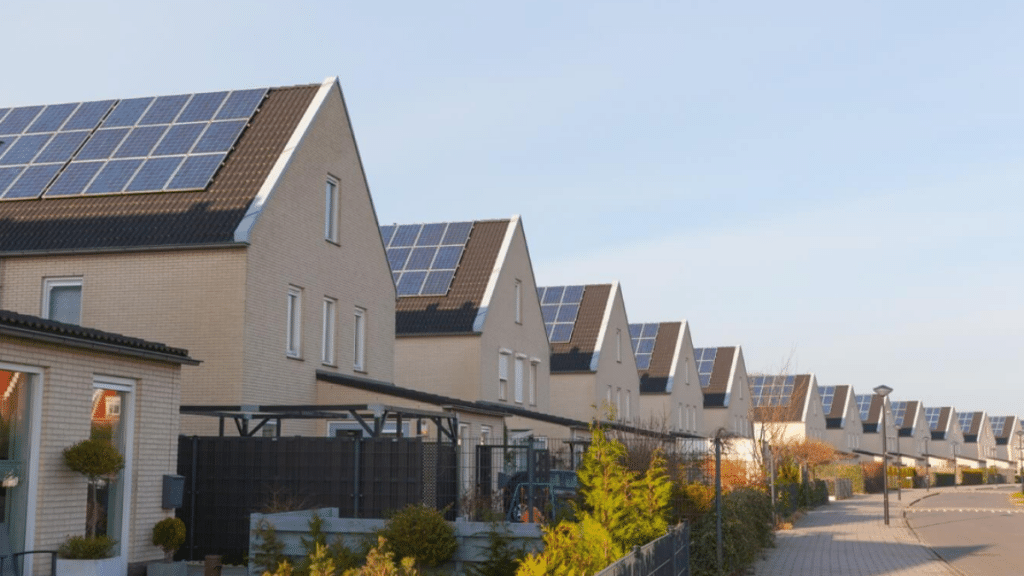Did you know? India’s solar power capacity has soared from 2.82 GW to an impressive 73.32 GW in December 2023. This incredible growth showcases people’s commitment to sustainable development and renewable energy. Besides the increasing trend, housing societies are adopting solar panel systems to reduce their carbon footprint and leverage various benefits.
From reducing overall energy consumption to uninterrupted power supply, the list of benefits associated with solar panel installations is never-ending, thus making the investment worthwhile. This article explores the tremendous benefits of installing solar panels for housing societies and takes a step closer to building a clear, greener, and sustainable future.
Potential Benefits Of Installing Solar Panels For Housing Societies
Environmental Sustainability
Installing solar power can significantly reduce the dependency on fossil fuels while mitigating greenhouse gases and combating climate change. Solar energy is a clean way to produce electricity without radiating harmful pollutants or carbon dioxide. Housing societies can play a critical role in reducing their carbon footprint and preserving the environment for future generations by adequately installing solar panels.
Cost Savings
While the initial investment in solar panel installation may seem quite high, it offers substantial long-term cost savings. Unlike traditional energy sources subject to price changes, solar panels generate electricity at little to no additional cost. This way, housing societies can significantly reduce their electricity bills, thus delivering financial relief to residents.
In addition, many government schemes and local authorities provide incentives such as subsidies, rebates, and tax credits to facilitate the adoption of solar energy. These financial incentives can further reduce the overall installation costs and boost the return on investment for housing societies.
Energy Independence
With solar panels installed, housing societies can generate electricity and achieve greater energy independence and resilience. They become less reliant on external energy providers and are better equipped to withstand power outages or disruptions in the grid. It ensures uninterrupted access to electricity while enhancing the overall reliability and stability of the energy supply within the community.
Property Value Enhancement
The housing societies with solar panels have high property value. Properties equipped with solar panels are increasingly attracting homebuyers and tenants due to their lower energy costs and environmentally friendly features. Likely, homes with solar panels sell faster and at higher prices than those without, delivering a significant return on investment for housing societies in the resale market.
Further, green building certifications and the installation of solar panels can differentiate housing societies in a competitive real estate market and attract environmentally conscious buyers and investors.
Community Engagement
Solar panels for housing societies deliver a massive opportunity for community engagement and education on renewable energy and sustainability. Residents can actively participate in the decision-making process for solar panel installation, offering a sense of ownership and pride in their community’s environmental initiatives.
Further, solar energy projects also provide opportunities for educational outreach, such as workshops, seminars, and informational sessions. It allows residents to learn about the incredible benefits of solar power, energy conservation practices, and ways to reduce their carbon footprint. The increased awareness and engagement can motivate house owners to adopt sustainable practices in their lives, thus contributing to a more environmentally conscious atmosphere in society.
Reduced Peak Demand and Grid Strain
Solar panels for housing societies can help alleviate strain on the electrical grid, particularly during peak periods. With the installation of solar panels, societies can reduce their reliance on the grid during times of high energy consumption, such as hot summer days when air conditioning usage is at its peak. It benefits the housing society by lowering electricity costs while preventing grid overloads and potential blackouts. Solar energy contributes to a more stable and reliable energy infrastructure.
Energy Security and Resilience
With the diversification of the energy mix, solar panels enhance energy security and significantly reduce dependence on finite fossil fuel resources. Unlike coal, natural gas, or oil, sunlight is abundant, inexhaustible, and a reliable source for delivering energy to housing societies. Solar power systems are modular and scalable, which allows the incremental expansion of capacity to meet evolving energy needs. It enhances the resilience of housing societies in the face of evolving energy challenges and uncertainties.
Public Health Benefits
Transitioning to solar energy can significantly benefit public health by reducing air and water pollution associated with conventional energy generation. Fossil fuel combustion releases harmful pollutants such as particulate matter, sulfur dioxide, and nitrogen oxides, which contribute to respiratory illnesses, cardiovascular diseases, and environmental degradation.
However, housing societies can improve air quality, protect public health, and mitigate the adverse impacts of pollution on communities by replacing fossil fuel-based electricity generation with clean solar energy.
Technological Innovation and Advancement:
Multiple research and development actions have evolved solar panel efficiency, energy storage technology, and grid integration solutions. As a result, solar power housing systems have become more affordable, efficient, and accessible, thus making them a practical option for housing societies constantly seeking sustainable solutions.
Further, housing societies can significantly contribute to the evolution of clean energy technologies and accelerate the transition to a low-carbon future by embracing the transformative powers of solar technology.
Conclusion
The choice of installing solar panels for housing societies is transformative, delivering numerous benefits. From significant reductions in electricity bills to environmental sustainability, solar panels provide a win-win solution.
Besides financial savings and environmental sustainability, it promotes a sense of community responsibility and forward-thinking. So, societies contribute to a greener future while gaining energy independence with solar power housing solutions. It is not just a choice for today but an investment for a brighter tomorrow.
